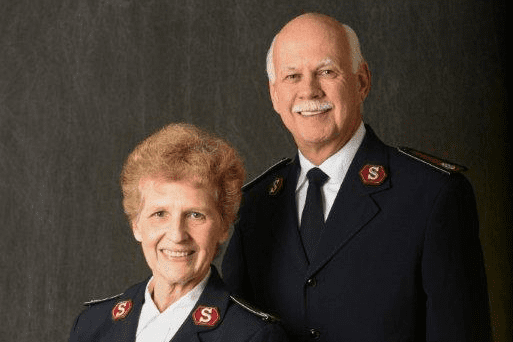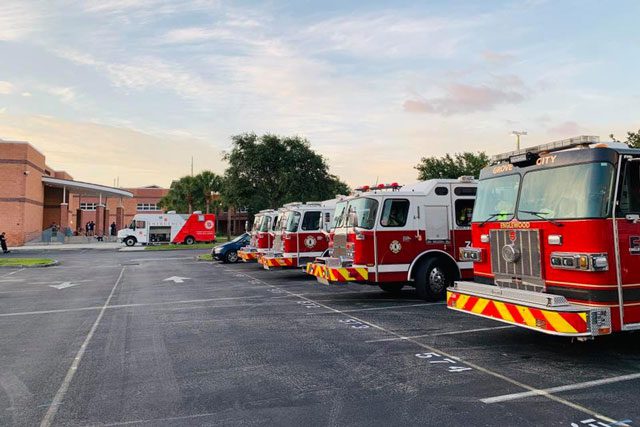National Social Services Conference
by Jeff Curnow –
(LEFT) Commissioner W. Todd Bassett, Social Service Excellence award recipient Harold Trujillo and Lt. Colonel Paul Bollwahn. Western Territory presenters included: (above at left of table) Robert Docter and (below) Jon Wallace. |
In his keynote address, Jim Wallis, Ph.D., executive director of Call to Renewal, encouraged delegates to The Salvation Army’s 2004 National Social Services Conference to resist thinking of the Army as an organization. Instead, he urged them to remember that it is a movement with a vision. He recalled the radical nature of early Salvationists who were “a protest against respectable churches,” and whose work so enraged people that “mobs would attack them, yet the Salvationists were the ones who were arrested.”
Wallis further likened the early Salvationists to Dr. Martin Luther King, Jr., one of his mentors, as he drew a parallel between Salvationists who were willing to go to jail and even die for what was right, and King’s action in the Civil Rights Movement of the ’60s.
Wallis also pointed out just how radical early Salvationists in America were by recalling the book, If Christ Came to Chicago, one of the most controversial books of its time, published by The Salvation Army and detailing the sex-slave trade in turn of the century Chicago. He emphasized this radicalism by quoting an early 20th century edition of the War Cry, which claimed, “The chief problem in America is the unequal distribution of wealth.”
Wallis challenged listeners with the statement that the poverty figures in the US today would be “simply unacceptable to Christ,” and that The Salvation Army, “must protest a society that finds it acceptable that so many of God’s children are left behind and left outside.”
In discussing the theme of hope, which Wallis defined as “believing in spite of the evidence and then waiting for the evidence to change.” He cautioned against expecting to feel a sense of hope as he stated, “Hope is not a feeling. Hope is a decision!”
As Wallis concluded, he exhorted those present to consider the fact that The Salvation Army through its social ministries, has garnered enormous respect in the United States and that Americans expect the Army to act as a leader in advocacy for the downtrodden, “You must realize the power of your voice, and never squander it.”
Rivers of Grace and Service
The Point, in Pittsburgh, Pennsylvania, marks the confluence of the Monongahela and Allegheny rivers; here these two rivers complete their journey and the Ohio River begins.
This mingling of waters provided more than the physical backdrop for the conference, it also inspired the theme of the event, “Rivers of Grace and Service: Caring at the Confluence of Ministry.”
From Saturday, March 20 through Wednesday, March 24, The Salvation Army National Social Services Conference (NSSC) convened just yards from The Point, as the Pittsburgh Hilton and Towers played host to over 500 delegates to the NSSC, and dozens of presenters from all U.S. territories and Canada, who conducted more than 75 workshops centered on improving the Army’s social ministries. With expectations and excitement high, delegates came to renew old ties, form new ones, learn and celebrate excellence.
Also present were 48 exhibitors from all areas of interest to those in the social services profession. They occupied 50 booths, and according to Major John Jordan, coordinator of exhibits, formed the largest group of exhibitors ever at the NSSC.
In his remarks at the welcome banquet, Commissioner Lawrence Moretz, territorial commander of the host USA Eastern Territory, welcomed the delegates to Pittsburgh by pointing out the interesting convergence of location and theme. He then honored the social services professionals; emphasizing their vital role in the work of The Salvation Army by calling them “Front line missioners with us in touching the mission, managing the mission and keeping mission momentum alive.” Moretz finally described the Army’s holistic ministries as one of the unchanging standards in a society that tries to cling to ever-changing values, providing hope to all whose needs are met.
Lt. Colonel Joseph DeMichael, Western Pennsylvania divisional commander, the host division for the conference, gave a warm and inspirational welcome to the assembled delegates. His message also centered on hope: “On a daily basis, you as a part of The Salvation Army meet those on the bottom rung of society. You are exposed to an America that most Americans would rather forget. You are a river of grace and mercy… it may sometimes seem that we are not making a difference, but God works according to his schedule and we must have hope that we do make a difference in the lives of those we touch.” With these words, it was clear that a theme for the conference was growing.
Commissioner Nancy A. Moretz brought the message for the conference holiness meeting. As she spoke, the theme of hope, both for those who the army serves and those who act as servants, was put into clear focus with the statements, “Life is not Futile, Failure is not Fatal and Death is not Final.”
Moretz emphasized that although we and those we serve may suffer setbacks, we have a river of grace and mercy in Jesus. Through Christ’s sacrifice, this river of grace “reaches into the cesspool of our sins and allows us to rise above them.”
She concluded her message with a challenge to the delegates: “The helping fields of The Salvation Army must become the harvest fields of The Salvation Army.”
Over the course of the next two days, a small army of presenters, chosen to share their success with their peers, covered topics from AIDS to Addictions, Disaster Relief to Advisory Board Development.
Presenters from the USA Western Territory included: Tom McSherry, who presented a series on Group Crisis Intervention; Major Sharron Hudson who team-taught with Major Judy Cheydleur of the USA Eastern Territory on Recruiting Volunteers; Doug Loisel, Ph.D., Bell Shelter director, who spoke about Creative Employment Programs for the Homeless; Claude Nikondeha, director of multicultural ministries at THQ, who presented on Dealing with Multicultural Dynamics; Anne Calvo, THQ’s child and vulnerable adult safety consultant, who ran an interactive workshop, What Bugs Your Client Bugs You; Jon R. Wallace, service extension director for the Intermountain Divis-ion, who gave a presentation on Working Together: The Service Extension and You; and Major Carol Seiler, asst. chief secretary for strategic planning, presented on Outcome-Based Youth Programming. Finally, called upon for presentations in both the pre-conference and conference sessions was Edward Lataille, Ph.D., of the ARC Command in Long Beach, who spoke on Medical Interventions in Addiction and Designing for Excellence in ARC Programs.
A time for attendees to visit some of the Army’s thriving ministries in the Pittsburgh area was a prime opportunity for the delegates to compare notes and gain insight into the methods that others use to move the work of the Army forward.
The conference began to draw to a close with a delegate forum, moderated by New Frontier Publications Editor-in-Chief, Robert Docter, Ph.D., entitled How Diverse People of God help the Army Achieve its Mission. The highlight of the lively discussion came when the moderator asked the panel if they prayed with those they served. Phil Mason, a member of the panel who is Jewish answered with an unequivocal, “Absolutely!” At the moderator’s urging, Mason offered a beautiful prayer of the type that he might use in a meeting with a client.
The highly anticipated social services awards banquet, where exemplary individuals and programs from each of the four US territories were honored, gave delegates time to celebrate accomplishments by their peers. Honorees from the Western Territory included Harold Trujillo, Director of the William Booth Shelter in Seattle, and Hickman House, a confidentially located haven for women and children escaping the terror of domestic violence.
The conference concluded with a breakfast on Wednesday morning, featuring a talk by Jim Towey, director of the White House Office of Faith-Based and Community Initiatives.
Lt. Colonel Paul Bollwahn, national social services secretary, conducted the conference wrap-up session.
The next conference will be held in Toronto, Canada, in 2006.











